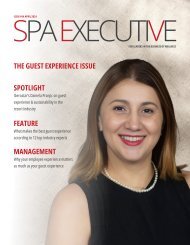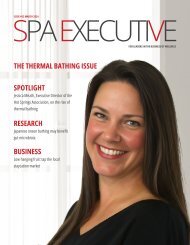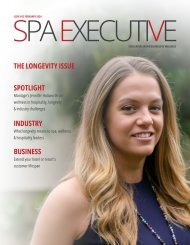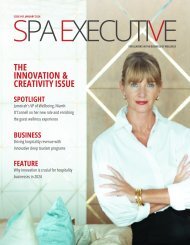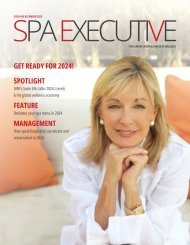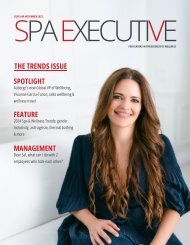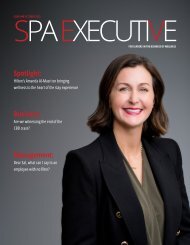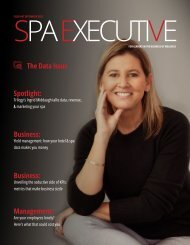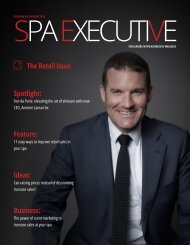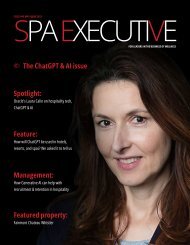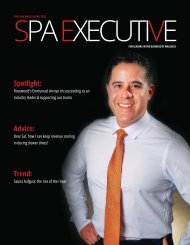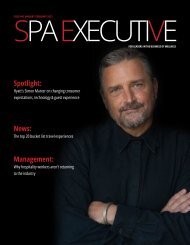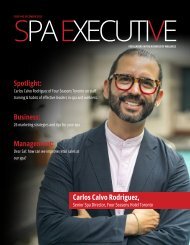Spa Executive May 2024
Create successful ePaper yourself
Turn your PDF publications into a flip-book with our unique Google optimized e-Paper software.
ISSUE #55 MAY <strong>2024</strong><br />
SPA EXECUTIVE<br />
FOR LEADERS IN THE BUSINESS OF WELLNESS<br />
THE HAPPINESS ISSUE<br />
SPOTLIGHT<br />
Six Senses’ Anna Bjurstam on wellness<br />
& happiness<br />
FEATURE<br />
What happiness means to top<br />
hospitality industry experts<br />
BUSINESS<br />
Deepak Ohri, Chief Happiness Officer, on<br />
bringing happiness to guests and staff in<br />
luxury hospitality
PUBLISHER<br />
Roger Sholanki<br />
Note from the Publisher<br />
EDITOR, CREATIVE DIRECTOR<br />
Elizabeth Bromstein<br />
DESIGNER<br />
Design Pickle<br />
AD SALES,<br />
CONTRIBUTING EDITOR,<br />
PRODUCTION MANAGER<br />
Sal Capizzi<br />
Dear Readers,<br />
As we move into summer, we're delighted to bring you a theme that touches the core of<br />
wellness: happiness. This issue of <strong>Spa</strong> <strong>Executive</strong> is dedicated to exploring the many facets<br />
of happiness within the hospitality industry, highlighting how joy and wellbeing are essential<br />
for both guests and staff.<br />
In the spotlight this month is Anna Bjurstam, Wellness Pioneer with Six Senses, who shares<br />
her insights on the brand’s wellness philosophy and the role happiness plays. Her unique<br />
perspective underscores the importance of purpose and meaningful connections in<br />
creating truly memorable experiences.<br />
Our feature article, "What Happiness Means to Top Hospitality Industry Experts," compiles<br />
wisdom from leading professionals who discuss how they cultivate happiness in their work<br />
environments, combining collective knowledge that reinforces the idea that happiness is<br />
not just an outcome but a vital element of exceptional service.<br />
We also explore the connection between happiness and wellness travel, why people who<br />
travel are generally happier, and how travel can enhance overall wellbeing. From the<br />
scientific research to practical applications, this issue provides a comprehensive look at<br />
how happiness can be nurtured through travel and hospitality.<br />
On the operational front, we continue to emphasize the importance of happy employees.<br />
<strong>Spa</strong> <strong>Executive</strong><br />
Research consistently shows that happy workers are more productive and contribute to<br />
better guest experiences. So, we’re highlighting strategies for fostering a positive work<br />
environment that benefits both staff and guests.<br />
<strong>Spa</strong> <strong>Executive</strong> is Book4Time’s<br />
magazine for leaders in the<br />
business of wellness. News,<br />
views, and interviews to help<br />
you attract top talent, increase<br />
customer retention, and offer<br />
the best possible<br />
guest experience.<br />
Thank you for your continued engagement with <strong>Spa</strong> <strong>Executive</strong>. I hope the insights in this<br />
issue inspire to enhance happiness within your business and beyond.<br />
Warm regards,<br />
Roger Sholanki,<br />
CEO,<br />
Book4Time
Contents<br />
<strong>May</strong> <strong>2024</strong><br />
Issue 55<br />
In this month’s issue:<br />
THE HAPPINESS ISSUE<br />
4<br />
6<br />
9<br />
11<br />
13<br />
15<br />
18<br />
Deepak Ohri, Chief Happiness Officer, on<br />
bringing happiness to guests and staff in<br />
luxury hospitality<br />
Wellness travel + the secret to happiness<br />
People who travel are happier than people<br />
who don’t<br />
Happy employees increase productivity<br />
& revenue in hospitality<br />
Meet Bondi: Chief Happiness Officer<br />
of the Fairmont Dallas Hotel<br />
What happiness means to top hospitality<br />
leaders & how they cultivate it at work<br />
SPOTLIGHT<br />
Six Senses’ Anna Bjurstam on wellness<br />
& happiness<br />
21<br />
FEATURED PROPERTY<br />
Ash <strong>Spa</strong> at Bowie House
THE HAPPINESS ISSUE<br />
Deepak Ohri, Chief Happiness Officer, on<br />
bringing happiness to guests and staff in<br />
luxury hospitality<br />
Happiness is an experience through which you<br />
can only connect the dots looking backwards,<br />
says Deepak Ohri, Chief Happiness Officer at<br />
LAMH.<br />
Deepak Ohri is the founder and CEO of<br />
Luxury Atelier Maison Happiness (LAMH),<br />
a California-based company specializing<br />
in luxury experiences and branding<br />
where he also holds the title of Chief<br />
Happiness Officer. Previously, he served<br />
as the CEO and Chief Happiness Officer<br />
of Lebua Hotels, which, under his<br />
leadership, was named the World’s<br />
Leading All-Suite Hotel by the World<br />
Travel Awards in 2022, while Ohri was<br />
also recognized as the “World’s Leading<br />
Happiness Ambassador” by the same<br />
organization.<br />
An expert in leadership and luxury<br />
hospitality, Deepak Ohri has lectured at<br />
prestigious business and management<br />
4 | <strong>Spa</strong> <strong>Executive</strong><br />
schools and serves on several boards,<br />
including the Advisory Board of the World<br />
Happiness Foundation.<br />
Given that success in luxury hospitality<br />
hinges on maximizing guest happiness, it<br />
seemed fitting to ask Deepak Ohri about<br />
his insights on bringing happiness to both<br />
guests and staff in the industry. Here’s<br />
what he had to say, in his own words:<br />
What is happiness?<br />
Happiness is not an expertise; it is an<br />
experience. People go to many different<br />
venues for happiness but you can never<br />
connect the dots moving forward. You only<br />
connect dots when you look backwards.<br />
Happiness is directly proportional to<br />
your purpose. A person can lose their<br />
job, and have nothing to do, and still be<br />
a very happy person if they have found<br />
the purpose in life. When you realize<br />
your purpose in your life, when you love<br />
what you’re doing, and when you actually<br />
know what you love, that is where you<br />
gain your happiness. Happiness relates to<br />
confidence, motivation, and all those tools<br />
that come along with that knowledge of<br />
your purpose.<br />
It doesn’t just come. You have to<br />
work for it.<br />
You have to practice and you have to<br />
believe in yourself. The first time you’re<br />
trying to do something, you don’t know<br />
whether you’re going to reach your<br />
destination or not. Then when you look<br />
back, you can see how one thing leads to<br />
the other and that leads to the other – and<br />
how you reached your destination, but you<br />
can’t know that in advance.
Now, let’s relate that to the corporate<br />
world. Because happiness is very<br />
individual, how do you give happiness<br />
to people in a collective form? In an<br />
organization, you give them a purpose.<br />
In an organization, when people have a<br />
purpose, there is a lot of happiness.<br />
They can say “I’m doing this for me<br />
and I’m doing this for the world.”<br />
This gives transparency to the organization<br />
as well as motivating people. And when<br />
they find purpose, they are in the line to<br />
find happiness.<br />
experience. You’re going to do both of<br />
these things but it is very important to<br />
know what to do first and what to do<br />
second. So, you’re going to use technology<br />
to note guest preferences and maybe<br />
look at their social media to see what they<br />
enjoy, and keep track of their purchases<br />
and preferences after check-in, so that<br />
everyone onsite is aware of what each<br />
customer likes, but you need a solid<br />
foundation first.<br />
A happy team is a foundation<br />
is paramount and individual needs are<br />
anticipated. Happiness isn’t just an end goal;<br />
it’s a journey that requires dedication and a<br />
deep understanding of human connections.<br />
How do you give guests a purpose?<br />
To provide your guests with a purpose,<br />
you give them an experience. The guest<br />
will never remember the chandelier or<br />
how many expensive things you put in<br />
the room. They will always remember the<br />
experience. On a recent trip to London, I<br />
checked into a new luxury hotel very early<br />
in the morning and the hotel manager<br />
was in the lobby to greet me with a<br />
cappuccino. I love drinking cappuccinos!<br />
I was craving that and thinking that I’ll get<br />
to the hotel, go check in, then come down<br />
and get a cappuccino because you can’t<br />
make cappuccino in your rooms. And it<br />
was already there.<br />
This hotel wasn’t even open yet. They had<br />
just done a soft opening and it’s already<br />
full. There’s a waiting list and they are<br />
doing the best average room rate in the<br />
city. And I’m not surprised. At every point<br />
in time, they were doing small things for<br />
every person, not only me.<br />
Personalization and anticipating people’s<br />
needs is important. But first you need to<br />
create a customer experience and then<br />
add the technology to it. You don’t add<br />
technology and then add the customer<br />
You can’t do any of these things if you<br />
don’t have great people who are motivated<br />
and who have found their purpose. If you<br />
fail to give that purpose, you may be the<br />
best organization but they won’t be happy<br />
working for you. They’re working for you<br />
for money or for the brand name and you<br />
will be facing problems and won’t be able<br />
to figure out why.<br />
To give your employees a purpose, first,<br />
you create your brand architecture<br />
and know what you want to give to the<br />
customer. Then you ask “how do I find<br />
people who can help in giving that?” And<br />
you choose people based on that idea.<br />
Design of service processes<br />
We design the service process in such a way<br />
that you touch it at every point. You have<br />
to take care of the beginning, the middle,<br />
and the end. That’s why the satisfaction rate<br />
in cruise lines is the highest in the service<br />
industry, because when you embark, there’s<br />
champagne, when you disembark, there’s a<br />
captain’s dinner, and in between, there are<br />
all kinds of activities and touchpoints.<br />
We should prioritize happiness in every<br />
aspect of luxury hospitality. It’s about<br />
fostering an environment where purpose<br />
5<br />
| <strong>Spa</strong> <strong>Executive</strong>
THE HAPPINESS ISSUE<br />
Wellness travel +<br />
the secret to happiness<br />
Happiness is something we all seek in one form<br />
or another and also something that is elusive<br />
to many or most of us. And yet, we persist.<br />
Because otherwise, what’s the point?<br />
There has been a lot of research over the<br />
years about where in the world people are<br />
happiest and what makes us happy.<br />
According to Gallup’s <strong>2024</strong> World Happiness<br />
Report, the top five happiest countries in the<br />
world are:<br />
1. Finland<br />
2. Denmark<br />
3. Iceland<br />
4. Sweden<br />
5. Israel<br />
Social scientist Arthur C. Brooks, who<br />
teaches a happiness course at Harvard<br />
University, has been looking into what<br />
it means to be happy for decades. And,<br />
according to CNBC, he’s found some<br />
answers. In a book co-written with Oprah<br />
Winfrey, Brooks and Winfrey write that<br />
happiness (like life) is not a destination and<br />
that, rather than seeking some end goal of<br />
happiness, we should be constantly working<br />
towards “happierness.”<br />
The book lists four major pillars for building<br />
a happy life: family, friendships, work,<br />
faith (which Brooks defines as “anything<br />
transcendent that helps you escape the<br />
boring sitcom that is your life”), as well<br />
as three “macronutrients of happiness”:<br />
enjoyment, satisfaction, and purpose.<br />
While all of this seems pretty intuitive,<br />
obtaining those increasing levels of<br />
“happierness” is still a common struggle.<br />
Lots of other past and ongoing research has<br />
found evidence for things that might make<br />
us happier. Here’s a deeper look at research<br />
findings from Brooks and others into what<br />
makes us happy/happier:<br />
Strong relationships<br />
Strong social and family relationships are<br />
essential for psychological wellbeing. The<br />
Harvard Study of Adult Development,<br />
which has been tracking hundreds of<br />
subjects since 1938, emphasizes that close<br />
relationships are a key predictor of longterm<br />
health and happiness. In fact, they<br />
were found to be the single most important<br />
factor over fame or wealth. Regular<br />
interactions, whether with family, friends, or<br />
colleagues, provide emotional support and<br />
can significantly reduce stress and anxiety.<br />
And, as we know, bad relationships can<br />
increase stress and anxiety.<br />
Gratitude practices<br />
Expressing gratitude has been linked to<br />
increased wellbeing. Regular practices like<br />
writing gratitude journals or sending thankyou<br />
notes may enhance appreciation for<br />
life and foster positive relationships. These<br />
activities can shift focus from what is lacking<br />
6<br />
| <strong>Spa</strong> <strong>Executive</strong>
to what is abundant, promoting a more<br />
positive outlook and reducing the risk<br />
of depression?.<br />
Physical health & exercise<br />
Physical activity is strongly correlated with<br />
improved mood and decreased rates of<br />
depression and anxiety. The biochemical<br />
effects of exercise, including the release<br />
of endorphins, play a significant role in<br />
enhancing mood and overall emotional<br />
wellbeing. Regular exercise also contributes<br />
to better physical health, which in turn<br />
supports psychological health?.<br />
Generosity & helping others<br />
Acts of kindness and helping others can lead<br />
to increased happiness for the giver. This<br />
phenomenon has been referred to as the<br />
“helper’s high,” and the theory is that helping<br />
others promotes the release of endorphins<br />
and provides a sense of satisfaction and<br />
belonging. Studies show that people<br />
who engage in acts of generosity report<br />
improvements in mental health?.<br />
Mindfulness & meditation<br />
Mindfulness meditation has been connected<br />
with reduced stress and anxiety. By focusing<br />
on the present and accepting thoughts and<br />
feelings without judgment, mindfulness may<br />
help to decrease negative emotions and<br />
increase resilience. Regular practice has<br />
been correlated with structural changes in<br />
the brain in areas connected with memory,<br />
decision making, and mood regulation, all of<br />
which may increase happiness levels.<br />
Positive life experiences & nostalgia<br />
Positive childhood experiences, like<br />
supportive family relationships and<br />
opportunities for play and education, can set<br />
a foundation for lifelong happiness. These<br />
experiences help in developing resilience,<br />
emotional intelligence, and the ability to<br />
form those required healthy relationships<br />
in adulthood. Research has also found<br />
that reminiscing about good times can<br />
improve mood and boost happiness, and<br />
that nostalgia may improve wellbeing by<br />
increasing gratitude.<br />
Economic stability<br />
Economic stability provides a foundation for<br />
happiness by eliminating stress related to<br />
basic survival needs like food, shelter, and<br />
healthcare. Higher incomes do correlate<br />
with higher happiness levels up to a certain<br />
point, after which the increase in happiness<br />
may plateau.<br />
Each of these factors plays a role in shaping<br />
our overall happiness, highlighting the<br />
importance of a balanced approach to life<br />
that incorporates social, psychological, and<br />
physical wellbeing.<br />
How wellness travel experiences<br />
promote happiness<br />
Travel and wellness also increase happiness.<br />
In a 2020 survey by Amex, 91% of<br />
respondents said that the ability to travel<br />
is important to their overall happiness.<br />
Aso, a 2021 study from Washington State<br />
University found that people who reported<br />
regularly traveling at least 75 miles away<br />
from home were about 7% happier when<br />
asked about their overall wellbeing than<br />
those who reported traveling very rarely or<br />
not at all.<br />
Just planning travel improves our happiness.<br />
The Let’s Go There Coalition and happiness<br />
researcher Michelle Gielan from the Institute<br />
for Applied Positive Research survey 263<br />
U.S.-based adults in 2020 and found that<br />
97% of survey respondents said having a<br />
trip planned makes them happier. Eighty<br />
two percent said a booked trip makes them<br />
“moderately” or “significantly” happier,<br />
and 71% reported feeling greater levels of<br />
energy knowing they had a trip planned in<br />
the next six months.<br />
Some reasons why wellness travel<br />
makes us happier<br />
Broadening perspectives: Travel exposes<br />
individuals to different cultures, lifestyles,<br />
and environments, broadening perspectives<br />
and fostering a deeper understanding<br />
of the world. These experiences can<br />
increase understanding of people from<br />
different backgrounds.<br />
Experiences over material goods:<br />
There’s a lot of evidence for the value of<br />
accumulating experiences rather than<br />
material goods for long-term happiness.<br />
Cornell psychology professor Thomas<br />
Gilovich has found that “the satisfaction we<br />
get from buying vacations, bikes for exercise<br />
and other experiences starts high and<br />
keeps growing. The initial high we feel from<br />
acquiring a flashy car or megascreen TV, on<br />
the other hand, trails off rather quickly.”<br />
Building lasting memories: As mentioned<br />
above, nostalgia and positive experiences<br />
build happiness – and travel can be a big<br />
contributor to those things. Travel not only<br />
brings immediate joy but also contributes to<br />
long-term happiness through the creation<br />
of cherished memories. According to one<br />
study, people derive more satisfaction<br />
from memories of experiences than from<br />
memories associated with material objects.<br />
7<br />
| <strong>Spa</strong> <strong>Executive</strong>
Overcoming challenges & fostering<br />
personal growth: Let’s be honest, travel<br />
can also be stressful. But those negative<br />
experiences, like getting lost in a foreign land<br />
or having to sleep on the airport floor, can<br />
later become some of our most cherished<br />
memories. Overcoming the obstacles and<br />
unexpected situations encountered on trips<br />
can lead to personal growth and resilience.<br />
The added benefits of wellness +<br />
adventure: Wellness and adventure travel,<br />
meanwhile, have the added benefit of<br />
directly and deliberately enhancing health<br />
and wellbeing on top of the benefits of<br />
travel alone.<br />
Book4Time can help<br />
Book4Time’s ancillary revenue software<br />
enhances customer experiences, crafting<br />
unparalleled guest journeys and memorable<br />
moments. By integrating smoothly with your<br />
hotel or resort’s current systems, Book4Time<br />
offers a highly acclaimed, user-friendly<br />
interface for both front and back-end users,<br />
increasing satisfaction for guests and staff<br />
alike. Book4Time frees up your staff’s time<br />
so they can focus on fostering significant<br />
guest relationships that enrich travel,<br />
staycations, and day pass experiences for<br />
everyone. Simply put: Book4Time makes you<br />
and your guests happier.<br />
8<br />
| <strong>Spa</strong> <strong>Executive</strong>
THE HAPPINESS ISSUE<br />
People who travel are happier than<br />
people who don’t<br />
What science says about travel and<br />
happiness: people who travel are happier<br />
than those who don’t<br />
In a world increasingly driven by work and<br />
routine, the pursuit of happiness may lead<br />
us to look to travel, with its promise of new<br />
experiences and escape from the daily grind.<br />
Does it work? Of course. Here’s what the<br />
research says:<br />
The more you travel, the happier<br />
you are<br />
In a 2022 study at the University of<br />
Alabama designed to examine the<br />
relationships between the beach, travel, and<br />
happiness, researchers found that people<br />
are significantly happier when actively<br />
anticipating or planning a vacation and that<br />
more is better, up to a point.<br />
Key findings included:<br />
1. Planning a vacation makes you happy.<br />
“People who are planning a vacation<br />
are significantly happier than those who<br />
aren’t,” said Dr. Jameson Hayes, one of the<br />
researchers.<br />
2. Beaches were the preferred vacation<br />
destination among the majority of<br />
respondents, with mountain vacations<br />
coming in second. “But the data shows that<br />
one’s happiness increases regardless of the<br />
type of destination.”<br />
3. The more you travel, the happier you are<br />
– but only up to a point. “Respondents who<br />
traveled for pleasure 15-21 days per year<br />
reported the highest levels of happiness.<br />
Those traveling less than two weeks per year<br />
or more than three weeks per year, reported<br />
being less happy.”<br />
The excitement of the anticipation<br />
Research by The Let’s Go There Coalition<br />
and happiness researcher Michelle Gielan<br />
from the Institute for Applied Positive<br />
Research supports the idea that just<br />
planning travel increases happiness. The<br />
team found that 97% of survey respondents<br />
said having a trip planned makes them<br />
happier. Eighty two percent said a<br />
booked trip makes them “moderately” or<br />
“significantly” happier, and 71% reported<br />
feeling greater levels of energy knowing they<br />
had a trip planned in the next six months.<br />
Respondents strongly agreed with the<br />
statements “Simply knowing there was<br />
something to look forward to would bring<br />
me joy” (95%) and “Planning travel for some<br />
time in the next six months would bring me<br />
happiness” (80%).<br />
9<br />
| <strong>Spa</strong> <strong>Executive</strong>
The importance of travel<br />
for wellbeing<br />
We know from separate studies, particularly<br />
the Harvard Study of Adult Development,<br />
that relationships are the main key to<br />
happiness overall. And travel can help with<br />
that. According to a 2020 Amex Trendex<br />
study from American Express, 91% of<br />
respondents say that the ability to travel is<br />
important to their overall happiness, while<br />
86% say travel is important to maintaining<br />
healthy relationships with family and friends.<br />
But that’s obviously not all it’s good for.<br />
A 2022 study by Japanese researchers<br />
designed to investigate the effects of a winter<br />
vacation on individuals’ wellbeing found that<br />
people who traveled had higher subjective<br />
levels of wellbeing than those who did not.<br />
The authors wrote that the findings<br />
underline the importance of taking vacations<br />
and savoring recovery experiences while off<br />
work. They also highlighted the importance<br />
of “mastery experiences,” which are activities<br />
performed that distract from one’s job<br />
by providing challenging experiences<br />
and learning opportunities in other areas<br />
and offer opportunities to experience<br />
competence and proficiency. “People place<br />
a high value on learning new skills and<br />
knowledge and hard-won experiences while<br />
on vacation, and such experiences may help<br />
improve wellbeing,” they wrote, also noting<br />
that simply experiencing something out of<br />
the ordinary enhances wellbeing.<br />
Another study backs up the idea that<br />
the more we travel the happier we are. A<br />
2021 study from the School of Hospitality<br />
Business Management at Washington State<br />
University found that frequent travelers are<br />
happier with their lives than people who<br />
don’t travel at all. Researchers found that<br />
survey participants who reported regularly<br />
10 | <strong>Spa</strong> <strong>Executive</strong><br />
traveling at least 75 miles away from home<br />
reported being about 7% happier when<br />
asked about their overall wellbeing than<br />
those who reported traveling very rarely or<br />
not at all.<br />
“While things like work, family life and friends<br />
play a bigger role in overall reports of<br />
wellbeing, the accumulation of travel<br />
experiences does appear to have a small yet<br />
noticeable effect on self-reported life<br />
satisfaction,” study author Chu-Chu Chen<br />
said. “It really illustrates the importance of<br />
being able to get out of your routine and<br />
experience new things.”<br />
Finding of previous research by Chen found<br />
that taking a leisure trip provides<br />
opportunities for relaxation, detachment<br />
from work, mastery experience, and<br />
personal control. The research examined<br />
the role of tourism experiences as a stress<br />
reliever and as recovery and found that<br />
these trips had positive effects on life<br />
satisfaction. Short trips were found to help<br />
people recover from work stress, while<br />
longer trips provide more opportunities for<br />
recovery experiences.<br />
The role of novel experiences<br />
in happiness<br />
Some of the benefits are derived from a<br />
human desire to seek out new experiences.<br />
A 2021 study from New York University<br />
found that new and diverse experiences are<br />
linked to enhanced happiness, and that this<br />
relationship is associated with greater<br />
correlation of brain activity. The results,<br />
authors said, revealed a previously unknown<br />
connection between our daily physical<br />
environments and our sense of wellbeing.<br />
“Our results suggest that people feel<br />
happier when they have more variety in<br />
their daily routines – when they go to novel<br />
places<br />
and have a wider array of experiences,” said<br />
researcher Catherine Hartley.<br />
The study tracked people by GPS and<br />
found that those who had more variability<br />
in their physical location reported feeling<br />
more positive: “happy,” “excited,” “strong,”<br />
“relaxed,” and/or “attentive.” Subjects also<br />
underwent MRI scans and results showed<br />
that people for whom this effect was the<br />
strongest exhibited greater correlation<br />
between activity in brain regions associated<br />
with the processing of novelty and reward.<br />
Collectively, these studies underscore the<br />
significant positive impact of travel and<br />
vacation planning on overall happiness and<br />
wellbeing. Whether it’s the anticipation, the<br />
variety of new experiences, or the act of<br />
traveling itself, each aspect contributes to<br />
enhancing life satisfaction and mental health.
THE HAPPINESS ISSUE<br />
Happy employees increase productivity<br />
& revenue in hospitality<br />
Happy employees are more productive and<br />
better for your hotel or resort brand in every<br />
way. How can you make your team smile?<br />
Happy workers are more productive. This<br />
is a truth supported by scientific evidence.<br />
How much more productive? It depends<br />
on who you ask, but studies suggest that<br />
it’s somewhere between 13% – 35%.<br />
One study from Oxford University, for<br />
example, found that happy employees<br />
are 13% more productive than unhappy<br />
employees. Happy employees are also<br />
more likely to be engaged in their work<br />
and to feel a sense of purpose, leading to<br />
better focus, concentration, and ultimately<br />
productivity. It’s just common sense.<br />
People work better when they feel better.<br />
In hospitality, like any other customerfacing<br />
industry where staff interactions<br />
with guests are directly tied to revenue,<br />
employee happiness is particularly<br />
important. Happy team members = happy<br />
guests. Disgruntled ones yield different,<br />
undesirable, results.<br />
Human connection + physical and<br />
emotional health<br />
So, what makes employees happy? You can<br />
probably guess that it’s the same things<br />
that make people happy in general, and<br />
those things include human connection<br />
and physical and emotional health.<br />
A recent survey by Wondr Health<br />
underscored the need for these things in<br />
the workplace. The findings of the survey<br />
of about 500 people around the world are<br />
in line with the 85-year Harvard study that<br />
affirms the key to happiness and health<br />
lies in close relationships.<br />
Wondr Health conducted the survey with<br />
its participants just before the new year<br />
and asked them to share what brings them<br />
the most happiness. Nearly 500 people<br />
responded around the globe with the<br />
following survey findings:<br />
Close relationships and human<br />
connection, including spending time with<br />
family: 30.1%<br />
Physical and emotional health and wellbeing:<br />
21.5%<br />
Engaging in activities that spark joy: 16.8%<br />
Financial freedom: 12%<br />
Helping others in need: 11.2%<br />
Career satisfaction and fulfillment: 7.9%<br />
Other: 0.6%<br />
Leadership can create a more rewarding<br />
work environment by addressing these<br />
areas, helping support employee<br />
happiness. Let’s talk about how.<br />
How to improve employee happiness<br />
in the workplace<br />
Close relationships & human<br />
connection: Promote a culture of<br />
inclusivity and camaraderie by maintaining<br />
11<br />
| <strong>Spa</strong> <strong>Executive</strong>
open communication, creating welcoming<br />
areas where staff can gather, relax,<br />
and spend time together, and being a<br />
supportive colleague as well as a leader.<br />
Team-building activities and social events<br />
can be great but should also be optional<br />
and include partners and families.<br />
Nobody should be made to feel forced<br />
to participate. Flexible scheduling and a<br />
supportive approach to work-life balance<br />
enable employees to spend more quality<br />
time with loved ones.<br />
Physical and emotional health & wellbeing:<br />
Encourage your staff to participate<br />
in your wellness programs, offering access<br />
to fitness facilities and wellness amenities.<br />
Discounts or a trade system for treatments<br />
and services can also be a fun idea –<br />
massage therapists can trade for facials<br />
for example. But, again, people should not<br />
feel obliged to participate. Busy parents, or<br />
single ones, don’t need to feel like they’re<br />
failing because they can’t fit workouts and<br />
yoga classes into their schedules. Offer<br />
mental health resources and support<br />
where needed.<br />
Engaging in activities that spark joy:<br />
Creating a work environment that allows<br />
for personal expression and fun can<br />
significantly boost morale. This could be<br />
through allowing staff to engage with<br />
customers in a manner that reflects<br />
their personalities, organizing creative or<br />
leisure activities that are enjoyable, and<br />
recognizing and rewarding employees who<br />
bring positive energy to their role.<br />
Financial freedom: Competitive wages,<br />
tips, bonuses, and opportunities for<br />
advancement are essential in providing<br />
employees with financial security. Offering<br />
financial planning resources and support<br />
can also help employees manage their<br />
earnings better and feel more secure in<br />
their financial situations.<br />
Helping others in need: Many people<br />
find satisfaction in altruistic activities.<br />
Employers can foster this by coordinating<br />
(optional) community service events or<br />
partnerships with local charities. This not<br />
only helps the community but also builds<br />
a positive brand image and deepens<br />
the employees’ sense of purpose and<br />
fulfillment. Allowing time to volunteer,<br />
and encouraging people to do so is also<br />
important, as is recognizing people’s<br />
efforts when they do good works.<br />
Career satisfaction & fulfillment: As<br />
stated above, hospitality employers should<br />
focus on providing clear pathways for<br />
career advancement. These should include<br />
training and development opportunities.<br />
Ensure everyone is aligned with company<br />
goals and targets so that everyone feels<br />
like they are an integral part of the<br />
company’s success. Regular feedback and<br />
open communication channels can help<br />
employees feel valued and understood,<br />
and align their career goals with the<br />
organizational objectives.<br />
Overall, enhancing employee happiness<br />
isn’t just about short-term boosts to<br />
morale but about creating a sustainable<br />
and positive work environment over<br />
the long term. By focusing on these key<br />
areas, companies can cultivate a happier<br />
and more motivated workforce, which<br />
improves productivity and benefits your<br />
entire organization. Investing in employee<br />
happiness is not just a moral imperative –<br />
it’s also a strategic one.<br />
12 | <strong>Spa</strong> <strong>Executive</strong>
THE HAPPINESS ISSUE<br />
Meet Bondi: Chief Happiness Officer of<br />
the Fairmont Dallas Hotel<br />
In March <strong>2024</strong>, the Fairmont Dallas<br />
announced that it had appointed a new Chief<br />
Happiness Officer.<br />
Bondi, a 6-month-old puppy, adopted from<br />
Dallas Fort Worth-based Operation<br />
Kindness, will serve as the hotel’s canine<br />
ambassador promoting positivity and<br />
happiness among colleagues and guests at<br />
the pet-friendly hotel.<br />
Bondi has graduated from a four-week<br />
intensive training program and is now<br />
welcoming guests, interacting with<br />
colleagues, and sharing joy throughout<br />
Fairmont Dallas’ hallways and common<br />
spaces. Her duties will also include<br />
participating in hotel activities and events<br />
and volunteering with organizations,<br />
including Operation Kindness.<br />
We asked Bondi’s spokespeople at<br />
Fairmont Dallas about Bondi’s duties and<br />
responsibilities, and how she brings joy to<br />
the hotel’s guests.<br />
Can you introduce Bondi, tell us<br />
about where Bondi came from, and<br />
why you adopted her?<br />
Bondi is a 9-month-old rescue puppy<br />
adopted from Operation Kindness, a local<br />
animal shelter that provides assistance<br />
to animals in need of medical care,<br />
companionship, and most of all, a home.<br />
Bondi was adopted by Yoke Yong, Director<br />
of Talent and Culture at Fairmont Dallas<br />
to serve as the hotel’s Chief Happiness<br />
Officer. As Chief Happiness Officer, Bondi<br />
is responsible for promoting positivity and<br />
happiness among colleagues and guests.<br />
Can you tell us how she became the<br />
Chief Happiness Officer at the hotel?<br />
Due to Bondi’s diligent work welcoming<br />
guests in the hotel’s lobby, making fast<br />
friends with Dallasites walking through the<br />
118-acre Dallas Arts District, and providing<br />
stress relief and smiles to meeting<br />
attendees and colleagues, Bondi was<br />
chosen by the hotel’s executive team to<br />
serve as Chief Happiness Officer.<br />
What does a typical day look like for<br />
Bondi in this role?<br />
Bondi arrives at work each weekday at 8<br />
a.m. with her owner, Yoke, and stops at<br />
the hotel’s lobby-level Starbucks for her<br />
daily pup cup. Bondi typically begins her<br />
day by spreading cheer and tail wags with<br />
her colleagues in the office. Throughout<br />
the day, Bondi will make rounds through<br />
the hotel lobby, greeting guests and other<br />
four-legged friends as Fairmont Dallas is a<br />
pet-friendly hotel with experience hosting<br />
13 | <strong>Spa</strong> <strong>Executive</strong>
dogs and cats of all shapes and sizes. In<br />
the afternoon, Bondi will enjoy the Dallas<br />
sunshine by romping on the rooftop<br />
terrace. Between scheduled appearances<br />
at various meetings and conferences<br />
taking place at the hotel, Bondi makes time<br />
for plenty of naps.<br />
What are her main responsibilities as<br />
the Chief Happiness Officer?<br />
What does Bondi enjoy doing in her<br />
free time when not working?<br />
In her free time, Bondi enjoys exploring<br />
the Dallas Arts District and visiting Klyde<br />
Warren Park’s My Best Friend’s Park, where<br />
she meets four-legged friends and plays<br />
fetch. Bondi is also training for the Dallas<br />
Marathon with her human, Yoke, and is<br />
excited to run the race this December.<br />
Bondi’s primary responsibility is to<br />
promote positivity and happiness among<br />
colleagues and guests. She is also available<br />
for special appearances at meetings and<br />
events to provide stress relief and smiles<br />
to business travelers.<br />
How does she help make guests<br />
feel welcome and happy during<br />
their stay?<br />
What are Bondi’s favorite rewards<br />
for doing a good job? What makes<br />
Bondi happy?<br />
Bondi’s favorite reward for a job well done<br />
is treats! She especially enjoys pup cups<br />
from the lobby-level Starbucks. Spreading<br />
joy is what makes Bondi the happiest. She<br />
loves seeing Fairmont Dallas guests and<br />
colleagues smiling.<br />
Bondi helps make guests feel welcome<br />
and happy during their stay by providing<br />
a friendly welcome upon arrival, offering<br />
comfort, and reducing stress after a day<br />
of travel. Always ready for a pat on the<br />
head or scratches behind the ears, Bondi’s<br />
unconditional love for all hotel guests<br />
brings a smile to everyone who visits.<br />
What special skills or tricks does<br />
Bondi have that help her in her job?<br />
Bondi is especially skilled in promoting<br />
joy and happiness through her<br />
infectious positive energy. When Bondi<br />
is energetically wagging her tail, allowing<br />
guests to pet her, chasing a toy on the<br />
terrace, or greeting her colleagues, she<br />
spreads smiles all around.<br />
14 | <strong>Spa</strong> <strong>Executive</strong>
THE HAPPINESS ISSUE<br />
What happiness means to top hospitality<br />
leaders & how they cultivate it at work<br />
Be happy for this moment.<br />
This moment is your life. –<br />
Omar Khayyam<br />
In the hospitality industry, the concept of<br />
happiness is a critical component of both<br />
guest satisfaction and employee engagement.<br />
Happiness is not just an outcome but<br />
a strategic pursuit and a key driver of<br />
excellence in hospitality. By cultivating<br />
environments where joy and wellbeing<br />
are prioritized, hospitality businesses can<br />
enhance service quality, foster positive work<br />
cultures, and drive success.<br />
Verena Lasvigne-Fox,<br />
International<br />
<strong>Spa</strong> Consultant, <strong>Spa</strong> &<br />
Wellness<br />
Industry Expert<br />
I had the chance to dive deeper into the<br />
science behind happiness when taking Yale<br />
University’s Science of Well-Being course<br />
during the pandemic. This course allowed<br />
me to reflect on what happiness means to<br />
me since it means something different to<br />
everyone. And I understood as well that my<br />
personal happiness level depends mainly on<br />
my own actions and decisions.<br />
In the professional context, happiness<br />
translates for me to creating an environment<br />
where both guests and staff feel valued,<br />
respected, and cared for. It’s about fostering<br />
a culture where everyone can thrive and<br />
experience moments of joy, whether they are<br />
staying for a night or working through a busy<br />
shift. Ultimately, it’s about how we make one<br />
another feel.<br />
Carlos Calvo Rodriguez,<br />
Senior <strong>Spa</strong> Director, Four<br />
Seasons Toronto<br />
We asked some of our best leading<br />
professionals in the spa and wellness sector<br />
what happiness means to them and how they<br />
bring happiness to their guests and staff, and<br />
they shared these thoughts with us:<br />
For me, happiness is a multifaceted<br />
experience that encompasses personal<br />
fulfillment, meaningful connections, and the<br />
ability to live authentically. It’s the feeling you<br />
get when you’re surrounded by loved ones,<br />
pursuing passions, or simply being present in<br />
the moment.<br />
Happiness is finding joy in the little things<br />
that make life special and remarkable. It’s not<br />
just a fleeting feeling, but a way of life! I strive<br />
to bring happiness to the guests and team<br />
members by taking the time to connect with<br />
them on a deeper level, and by celebrating<br />
life’s daily accomplishments, not just the<br />
major milestones. I believe we achieve<br />
happiness by showing love, giving love, and<br />
receiving love.<br />
15 | <strong>Spa</strong> <strong>Executive</strong>
Most folks are as happy as they make<br />
up their minds to be.<br />
– Abraham Lincoln<br />
Maritsa Victorian,<br />
Area Director of <strong>Spa</strong>,<br />
Remington Hospitality,<br />
Bardessono Hotel and<br />
<strong>Spa</strong>, Hotel Yountville<br />
Happiness comes from within, being true to<br />
who you are, and maintaining an optimistic<br />
outlook regardless of circumstances. At<br />
Bardessono, we hire individuals who share<br />
this positive attitude, creating an environment<br />
where it’s almost impossible to resist the<br />
uplifting energy. We foster positivity because<br />
we genuinely love welcoming and serving our<br />
guests. Our sincere service and kindness are<br />
immediately recognized and appreciated,<br />
bringing everyone into the present moment,<br />
making them smile and feel good. This joy<br />
is contagious – it makes us feel good too.<br />
Happiness also stems from self-acceptance<br />
and liking yourself on the inside, which<br />
gives you a beautiful glow on the outside.<br />
When mind, body, and spirit are in balance,<br />
happiness radiates and it is infectious.<br />
Participating in what truly brings me joy is<br />
also happiness. I have a sign in my office that<br />
states, “Do what you love and love what you<br />
do” and I wholeheartedly believe in that. Since<br />
we spend so much of our time at work, our<br />
jobs should be our passion. Getting paid for<br />
what we love to do is simply a bonus.<br />
my community. I infuse a “life is happening<br />
now” energy into every wellness concept,<br />
allowing guests to find their own version<br />
of happiness and vibrancy. As for my team<br />
members, I genuinely love working with<br />
practitioners and wellness professionals. This<br />
love translates into opportunities for them to<br />
learn something new, support them in their<br />
professional journey, and offer a tight hug<br />
and a smile, always. Making others happy is<br />
my love language.<br />
Everything has its wonders, even<br />
darkness and silence, and I learn,<br />
whatever state I may be in, therein to<br />
be content.<br />
– Helen Keller<br />
Jennifer Lynn, Director<br />
of <strong>Spa</strong> & Wellness,<br />
Fontainebleau Las Vegas<br />
Accept people and situations as they<br />
are. When you accept, you find freedom.<br />
Acceptance of things allows us to respond<br />
rather than react. Typically, we only like to<br />
accept the things we like or the situations<br />
we agree with. A profound life is lived<br />
in our ability to accept everything as it<br />
is. Acceptance allows us to receive in an<br />
open state. Non-acceptance is limiting<br />
and small and distances us from the<br />
profoundness of life.<br />
Happiness is when what you think,<br />
what you say, and what you do are in<br />
harmony.<br />
– Mahatma Gandhi<br />
Daisy Tepper, Director<br />
of <strong>Spa</strong> Operations &<br />
Development, Landry’s,<br />
The Post Oak Hotel<br />
Happiness is a state of emotional<br />
well-being. Gratefulness, positivity<br />
and appreciating all we have in life.<br />
Understanding there’s a lot worse in the<br />
world. I motivate my team by highlighting<br />
all the wonderful things we have in our<br />
lives, the great company we work for,<br />
appreciating all of their accomplishments,<br />
especially our Forbes rating for the past six<br />
years. I challenge the team to always find<br />
the positive out of the negative and focus<br />
on that.<br />
Vivianne Garcia-Tunon,<br />
Vice President of<br />
Operations, Wellbeing,<br />
Auberge Resorts<br />
Collection<br />
To me, happiness means enjoying the simple<br />
moments of awe and celebrating everything!<br />
It involves leading with an open heart,<br />
expressing my emotions, and creating deep<br />
connections with my team members and<br />
As leaders in spa operations, we have the<br />
opportunity to set the happiness tone for the<br />
day. It starts at the top. Showing up, being<br />
present, supportive and genuinely hospitable<br />
is key to setting the stage for a happy<br />
destination for spa guests and our spa team.<br />
16 | <strong>Spa</strong> <strong>Executive</strong>
ARE YOU PASSIONATE ABOUT THE<br />
SPA & WELLNESS INDUSTRY & DO<br />
YOU LOVE TECHNOLOGY?<br />
COME WORK FOR US.<br />
Book4Time is the global leader in spa, wellness, and leisure activity management<br />
software for the hospitality market, operating in more than 85 countries.<br />
Book4Time is experiencing rapid growth and hiring experienced professionals in a<br />
number of key roles. We offer:<br />
• 100% employer-paid premium benefits<br />
• Wellness/fitness membership program<br />
• Company match group RRSP program<br />
• 18 days of paid time off plus corporate holidays<br />
• Remote-First work environment (Office location: Markham, ON)<br />
• Free underground parking<br />
• Budgeted professional development<br />
• Wellness Stipend<br />
• Discounts at our customer locations<br />
Browse open positions here<br />
We look forward<br />
to working with you!
THE HAPPINESS ISSUE<br />
Six Senses’ Anna Bjurstam on wellness<br />
& happiness<br />
Anna Bjurstam is the “Wellness Pioneer”<br />
at Six Senses. We talked about her role, Six<br />
Senses’ wellness philosophy, and people’s<br />
happiness factor.<br />
Six Senses stands out among luxury brands<br />
specializing in five-star hotels, resorts,<br />
and wellness spas offering immersive<br />
experiences blending local culture, nature,<br />
and wellness. Six Senses properties are<br />
located in some of the most picturesque<br />
and culturally rich environments across<br />
the globe, including Portugal, Fiji, Vietnam,<br />
Thailand, and the Maldives.<br />
Six Senses <strong>Spa</strong>s offer a wide range of<br />
holistic wellness, rejuvenation, and beauty<br />
treatments administered under the<br />
guidance of expert therapists. A key element<br />
of all Six Senses properties, Six Senses <strong>Spa</strong>s<br />
are also hosted by prestigious hotels and<br />
resorts in many other locations.<br />
Anna Bjurstam is the Wellness Pioneer<br />
for Six Senses. An industry veteran of<br />
25 years, Ms. Bjurstam also acts in the<br />
same capacity for Raison d’Etre, a brand<br />
she co-founded, and as an independent<br />
consultant and Global Wellness Summit<br />
board member. Her expertise extends<br />
beyond traditional wellness, incorporating<br />
elements like shamanism, energy medicine,<br />
and BioGeometry. And her approach<br />
to wellness is holistic, emphasizing<br />
sustainability and community. Ms. Bjurstam<br />
has been instrumental in driving forward the<br />
concept of wellness in hospitality, promoting<br />
practices that foster connection to others<br />
and the environment.<br />
In 1997, Mrs. Rosamond Freeman Attwood<br />
founded Raison d’Etre <strong>Spa</strong>s, which Ms.<br />
Bjurstam was a part of and joined full time<br />
in 2000. Raison d’Etre became a leader<br />
in the spa industry and was sold in 2013<br />
. Ms. Bjurstam’s educational background<br />
includes a master’s degree in finance, and<br />
she has a deep interest in quantum physics<br />
and science, which she integrates into her<br />
wellness philosophy.<br />
We spoke with Anna Bjurstam about her<br />
role, Six Senses’ wellness philosophy, and<br />
people’s happiness factor.<br />
Can you please talk about your role<br />
there and what it entails?<br />
When I started with Six Senses, I was in<br />
charge of spas and wellness. After about<br />
six years, operations were doing very well,<br />
so I kind of handed it over, and today I have<br />
made up my own title, which is Wellness<br />
Pioneer. I love that title as you’re kind of<br />
pioneering and you can make mistakes,<br />
and that’s okay, because it is a pioneering<br />
industry. So, I’m in charge of our wellness<br />
strategy, the future, where we’re heading,<br />
and of the club concept that we’re going<br />
to launch next year, Six Senses Place. The<br />
first is in London, and then we’re launching<br />
in Bangkok, Dubai, Tel Aviv, New York, and<br />
Lisbon. I also work with a lot of start-ups on<br />
the side.<br />
18 | <strong>Spa</strong> <strong>Executive</strong>
Can you talk to me about Six Senses’<br />
wellness philosophy?<br />
At Six Senses, our wellness philosophy is<br />
built upon foundational pillars that form<br />
the core of our approach to holistic wellbeing.<br />
These pillars are: mindfulness, eat,<br />
sleep, move, live naturally, and connect.<br />
One of the primary pillars is nutrition. We<br />
prioritize locally sourced, organic, clean<br />
ingredients, and are 50% plant based. We<br />
offer comprehensive, from-the-ground-up<br />
sleep programs aimed at optimizing sleep<br />
quality and duration for our guests, from<br />
designing sleep-friendly environments with<br />
quality bedding to sleep assessments and<br />
support. Everything has been approved by<br />
sleep doctors. In every location we have<br />
our integrated biomarker screening. Our<br />
educated practitioners have a minimum<br />
five-year education in health. This can be in<br />
exercise physiology or as a naturopath, or<br />
something else. This is a non-invasive, FDA<br />
approved device that gives us a very good<br />
understanding of a person’s health and<br />
wellness status, to guide us in personalizing<br />
programs to individuals.<br />
We have a systemized approach across<br />
all of our properties, including the same<br />
food system, whether in China, Thailand, or<br />
Europe — the ingredients change, but the<br />
system and the parameters are the same.<br />
We have the same beds in all our locations,<br />
our integrated wellness is the same. We also<br />
have a kids program called Grow with Six<br />
Senses. The framework is the same wherever<br />
you are but you do different things if you’re<br />
in Thailand vs Switzerland. We have the same<br />
base treatment menu in every location. But<br />
then, in India we do Ayurveda, in Thailand we<br />
do Thai massage. We try to make everything<br />
as localized as possible.<br />
And then of course, sustainability is a big<br />
thing, and that feeds into wellness. We’re<br />
probably the most sustainable hotel company<br />
out there today. We haven’t had plastic<br />
bottles for 20 years. We are plastic free in<br />
our locations. We still have plastic computers<br />
and the AC is built from plastic, but single-use<br />
plastic is almost completely gone<br />
Could you discuss how wellness<br />
trends vary in different locations<br />
around the world? Like,<br />
between Asia, Europe, and other<br />
regions? What are some notable<br />
developments in these areas?<br />
Countries are becoming more and more<br />
proud of their own indigenous wellness<br />
treasures, such as TCM in China, Ayurveda<br />
in India, or other healing modalities in South<br />
America. That’s something in which we’re<br />
seeing a big surge. We’re also seeing a<br />
strong trend where guests are seeking out<br />
native healing traditions. On the complete<br />
other end of things, longevity is booming<br />
much more in Europe and the US compared<br />
to Asia. Asia and that side of the world is<br />
more spiritual and connected to nature in<br />
everything they do. They’re smarter than we<br />
are, because if your connected with nature,<br />
have community, and feel that you have<br />
a purpose, you’re happier and healthier,<br />
and live longer than people who do IVs and<br />
injections and stem cells while stressing<br />
about it. But biohacking is obviously still<br />
something that’s really happening.<br />
China is also very focused on beauty. Beauty<br />
is booming and they’re moving through<br />
beauty trends at super speed.<br />
They’re really into natural cosmetics and<br />
cosmetic supplementation.<br />
Are you seeing a rise in interest<br />
in wellness travel and interest in<br />
wellness in general?<br />
It’s Booming! It’s incredible how big it is.<br />
Five or so years ago, maybe 25% – 30%<br />
of our guests were interested in wellness.<br />
Now, I would say it’s 99%. This is probably<br />
more the case at Six Senses than at some<br />
other resorts because we’re now known for<br />
wellness. We’re not running serious wellness<br />
retreats but we have more wellness than<br />
other hotel brands and you can dip your<br />
toe in if you’re interested. You can do this<br />
biomarker screening, but you don’t have<br />
to do a whole detox program, and you can<br />
learn about how to create your own body<br />
scrub, deodorant, and face cream at our<br />
Alchemy Bar.<br />
So, yes, I’d say that things have completely<br />
changed. The early adopters, who were<br />
interested five years ago are now doing<br />
intermittent fasting and cold dips and blue<br />
blocking glasses. And then the other 70%<br />
are getting more and more interested in<br />
how to eat well, how you sleep better, and<br />
that sort of thing.<br />
Why do you think there is this rise<br />
in interest?<br />
I think people are tired and overwhelmed.<br />
When we look at our phone in the morning,<br />
in that first 30 minutes our brains get as<br />
much information as we did in a full week 50<br />
years ago. We’re completely overwhelmed<br />
with information and people are tired. That’s<br />
what we’re seeing. People are not sleeping,<br />
they’re worried, they’re stressed, their<br />
cortisol levels are too high. They need to<br />
learn how to stimulate their vagus nerve and<br />
improve their HRV. And you do that through<br />
relaxation, being out in nature, and going<br />
back to basics.<br />
19 | <strong>Spa</strong> <strong>Executive</strong>
How does technology fit into<br />
wellness and hospitality these days?<br />
Do you find you are using more of it?<br />
We’re using a lot more technology, but<br />
we’re trying to be mindful. I’m using<br />
wearables at the moment because I am in<br />
the period of measurements, but then I’ll<br />
go three or four months and do nothing.<br />
Because the most important thing is to<br />
listen to your own body and its cues. It’s<br />
much smarter than any wearable, but<br />
sometimes we need wearables to learn<br />
about our bodies, which is interesting. So,<br />
I think we’re trying to use it mindfully at Six<br />
Senses in the sense that we use it when it<br />
serves us and not when it doesn’t.<br />
Be mindful of digitally detoxing every day<br />
if you can. We encourage our guests not<br />
to look at their phones first thing in the<br />
morning if possible. Because that will<br />
overstimulate the brain and the brain<br />
gets tired. You’re supposed to have a slow<br />
buildup of your brain function.<br />
Can you address how all of the things<br />
that you do at Six Senses contribute<br />
to happiness. Do you think a lot<br />
about people’s happiness factor?<br />
Yes, we do. Incredibly much, I would say.<br />
But not really “happiness” exactly, because<br />
happiness is a cursed word. It means that<br />
you have to do something to become<br />
happy, like buy a new car. If we talk to<br />
Buddhist monks, they talk instead about<br />
“contentment.” Contentment is something<br />
to strive for because happiness implies that<br />
we always have to be on a high end.<br />
content. If we are content in life, we have<br />
joy. Being content brings more fulfillment.<br />
I believe that, more than anything else,<br />
spiritual wellbeing and finding awe and<br />
wonder and curiosity in life is what creates<br />
what we call happiness.<br />
That’s why we’re so big on things like<br />
retreats and festivals. We want to create<br />
that community. We’ve also been rolling out<br />
communal tables and conversation cards<br />
on tables. So, you can put your phone in a<br />
box and use conversation cards. It’s been<br />
so successful. Guests are loving it.<br />
What are you excited about?<br />
I’m incredibly excited about longevity and<br />
what you can do to prevent needing to<br />
go to hospital or getting various diseases.<br />
Seventy percent of Americans suffer from<br />
autoimmune disease, and 40% have two.<br />
The likelihood that I will get cancer is pretty<br />
big, but if I do the longevity measures, I<br />
can maybe push that forward five years<br />
and that’s huge. So, I’m very excited about<br />
longevity research and also the more<br />
technical stem cell, exosomes, peptides<br />
research that’s happening at the moment.<br />
Female health has been growing and I’ve<br />
learned so much in the last couple of years<br />
that I wish I knew before about how my<br />
body actually works. And then I’m very<br />
excited about shamanism and energy<br />
medicine because that’s something very<br />
close to my heart.<br />
We’re rolling out a program later this year<br />
for spiritual wellbeing, which is about<br />
having purpose and being connected with<br />
yourself and others. Having a community<br />
is very important for being happy or being<br />
20 | <strong>Spa</strong> <strong>Executive</strong>
Featured property:<br />
Ash <strong>Spa</strong> at Bowie House<br />
Ash <strong>Spa</strong> at Bowie House in Fort Worth Texas<br />
is a rustic yet luxurious sanctuary inspired<br />
by the great outdoors, named for the state’s<br />
plentiful ash trees and constructed to mirror<br />
its ubiquitous barns<br />
Auberge Resorts Collection’s Bowie House is<br />
a new, luxury, urban retreat on Fort Worth<br />
Texas’ Camp Bowie Boulevard. The hotel<br />
embodies the unique character of Fort<br />
Worth, merging the classic Western charm<br />
of Texas with a modern touch, creating an<br />
atmosphere that captures approachable<br />
sophistication, cultural vibrancy, and the<br />
equestrian spirit of Fort Worth. Bowie<br />
house is located in one of the city’s most<br />
iconic neighborhoods, close to museums,<br />
restaurants, and the legendary Will Rogers<br />
Memorial Center.<br />
Renowned design firm BOKA Powell blends<br />
the traditional and modern, using brick and<br />
cast stone reminiscent of cowboy days with<br />
striking glass features, a lush pool terrace,<br />
and inviting gathering spaces. Eighty eight<br />
studios, 12 Lofts, and 6 Suites exude the<br />
warm spirit of the West. Several feature<br />
open-air balconies, and all offer beautiful<br />
views over the city’s Cultural District or lush<br />
courtyard gardens.<br />
Three dining and drinking options offer a taste<br />
of modern Texan cuisine and unique culinary<br />
experiences, including backyard cookouts and<br />
multisensory food and spirit tastings.<br />
Ash <strong>Spa</strong> at Bowie House<br />
Ash <strong>Spa</strong> is a rustic yet luxurious sanctuary<br />
inspired by the great outdoors, named<br />
for the state’s plentiful ash trees and<br />
constructed to mirror its ubiquitous barns.<br />
The spa features five treatment rooms, a<br />
sauna and steam room, a fitness center,<br />
nail studio, boutique, and relaxation lounge.<br />
An oasis for both locals and travelers, Ash<br />
boasts a unique menu of skin health and<br />
bodywork offerings focused on offering<br />
guests holistic and natural as well as<br />
cutting-edge treatments. Signatures include<br />
the full-body Deep West to soothe and<br />
strengthen every body, scalp and facial<br />
muscle using acupuncture stretching,<br />
cupping, and heated pads. The Qi Beauty<br />
Facial, which stimulates the revitalization<br />
of skin through the use of carefully<br />
manipulated magnetic fields and gradients,<br />
is another highlight.<br />
Experiences include water dancing,<br />
synergistic skin treatments, infrared therapy,<br />
non-sleep deep rest massage, and madeto-measure<br />
apothecary, while daily fitness<br />
classes and a program of visiting wellness<br />
specialists ensure guests and locals alike<br />
have every opportunity to optimize their<br />
well-being. Guests not staying at the<br />
hotel can unwind with the Wellness Pass,<br />
providing full access to the exclusive terrace<br />
pool, spa and fitness center.<br />
21 | <strong>Spa</strong> <strong>Executive</strong>
FOR LEADERS IN THE BUSINESS OF WELLNESS<br />
ADVERTISE WITH US<br />
CONTACT SAL CAPIZZI FOR MORE INFORMATION<br />
SCAPIZZI@SPAEXECUTIVE.COM





